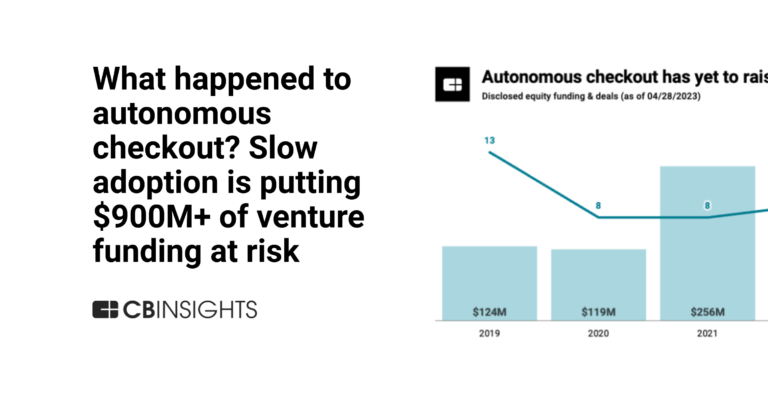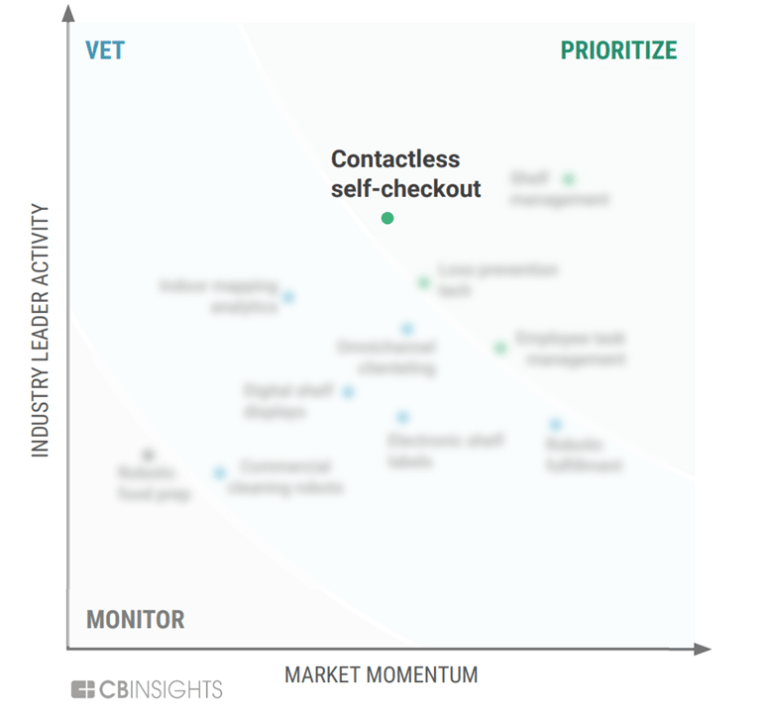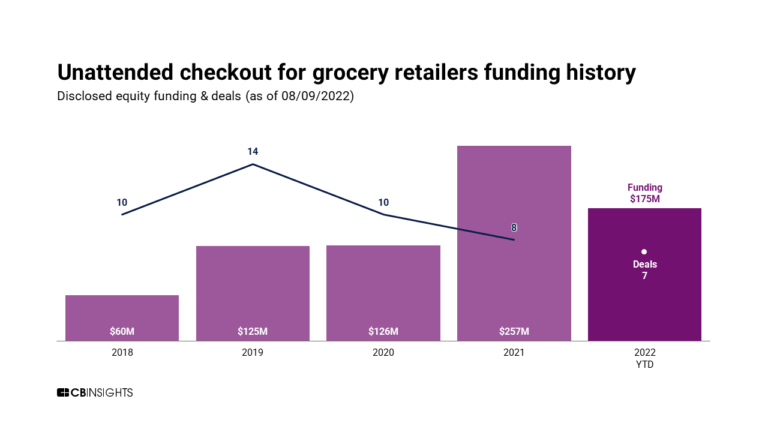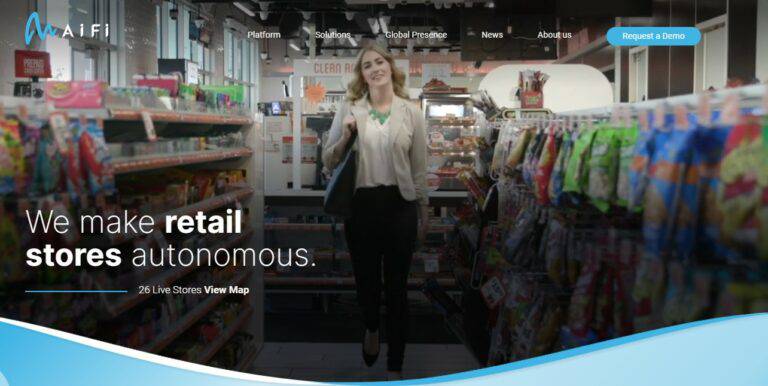
Standard AI
Founded Year
2017Stage
Unattributed VC - II | AliveTotal Raised
$236.32MMosaic Score The Mosaic Score is an algorithm that measures the overall financial health and market potential of private companies.
-37 points in the past 30 days
About Standard AI
Standard AI operates as a company focused on transforming the retail industry through artificial intelligence. The company offers a platform that uses artificial intelligence (AI)-powered cameras and deep algorithms to provide checkout-free shopping experiences, real-time reporting on shopper behavior, and insights into inventory and stocks. Its primary services are utilized in the retail sector. It was founded in 2017 and is based in San Francisco, California.
Loading...
ESPs containing Standard AI
The ESP matrix leverages data and analyst insight to identify and rank leading companies in a given technology landscape.
The unattended checkout market offers a range of solutions to retailers looking to provide unmanned point-of-sale and checkout technology. Solutions involve the deployment of kiosks, mobile applications, and computer vision technology to facilitate a seamless and contactless checkout experience for customers. This market is driven by the increasing demand for convenient and efficient shopping expe…
Standard AI named as Challenger among 14 other companies, including Amazon, AiFi, and MishiPay.
Standard AI's Products & Differentiators
Self-Checkout
Standard AI acquired Skip, the world leader in self checkout. The acquisition enables them to provide customers with self-checkout kiosks and cloud-based POS and integrations
Loading...
Research containing Standard AI
Get data-driven expert analysis from the CB Insights Intelligence Unit.
CB Insights Intelligence Analysts have mentioned Standard AI in 5 CB Insights research briefs, most recently on May 3, 2023.


Feb 2, 2022 report
Why Retail Leaders Are Prioritizing Contactless Self-CheckoutExpert Collections containing Standard AI
Expert Collections are analyst-curated lists that highlight the companies you need to know in the most important technology spaces.
Standard AI is included in 11 Expert Collections, including Store tech (In-store retail tech).
Store tech (In-store retail tech)
2,084 items
Companies that make tech solutions to enable brick-and-mortar retail store operations.
Unicorns- Billion Dollar Startups
1,249 items
Grocery Retail Tech
831 items
Startups providing B2B solutions to grocery businesses to improve their store and omni-channel performance. Includes customer analytics platforms, in-store robots, predictive inventory management systems, online enablement for grocers and consumables retailers, and more.
Payments
3,034 items
Companies in this collection provide technology that enables consumers and businesses to pay, collect, automate, and settle transfers of currency, both online and at the physical point-of-sale.
Future Unicorns 2019
50 items
New Retail Formats
368 items
Tech-enabled, physical retail selling formats that reach beyond the walls of a traditional store.
Standard AI Patents
Standard AI has filed 108 patents.
The 3 most popular patent topics include:
- machine learning
- artificial neural networks
- artificial intelligence

Application Date | Grant Date | Title | Related Topics | Status |
|---|---|---|---|---|
5/10/2022 | 9/3/2024 | Artificial neural networks, Machine learning, Classification algorithms, Artificial intelligence, Computer vision | Grant |
Application Date | 5/10/2022 |
|---|---|
Grant Date | 9/3/2024 |
Title | |
Related Topics | Artificial neural networks, Machine learning, Classification algorithms, Artificial intelligence, Computer vision |
Status | Grant |
Latest Standard AI News
Oct 7, 2024
Standard AI is a company that is equipping brick-and-mortar stores and their suppliers with the data they need to solve the hardest problems in physical retail: unlocking insights with unparalleled fidelity and precision about people, products, and interactions. Pulse 2.0 interviewed Standard AI CTO David Woollard to learn more about the company. David Woollard’s Background What is David Woollard’s background? Woollard said: “I pursued a PhD in computer science from the University of Southern California, where I focused on software architectures for high-performance computing and scientific simulation. In parallel, I started my career at NASA’s Jet Propulsion Lab (JPL) in Pasadena, working primarily on large-scale data systems, including multiple Earth-observing satellite systems. After five years at NASA, I wanted to work with technology that more directly impacted everyday users and consumers. I spent time building experiences and products in multimedia and for companies like Samsung. In those roles, I started thinking more about how technology could improve or tackle challenges we see in physical spaces. That interest led me to Standard AI where I’m now CTO. It’s an exciting time at Standard AI as we shift the application of our AI tech stack to provide shopper behavior insights within a specific zone in a store. Formation Of Standard AI How did the idea for the company come together? Woollard shared: “The idea for Standard AI started by asking how we can apply AI and computer vision technologies to transform the retail sector. Initially, we focused on building an autonomous checkout solution, wanting to give shoppers a unique and frictionless experience.” “What we found while building this solution is that both shoppers and retailers aren’t quite ready for this on a mass-market scale. Given the existing technology stack of most retailers, running this compute-heavy workload onsite is a large capital investment and shopper adoption wasn’t as rapid as necessary, even as autonomous became synonymous with contactless during Covid.” “In building a solution for autonomous checkout, we had to solve the myriad challenges of detecting interaction of people, products and zones with unparalleled precision. What is a simple task of distinguishing between someone purchasing a 8.4oz or 11oz can of Red Bull when scanning a barcode is actually a complex technical challenge when attempted based on video footage from a ceiling-mounted camera.” “Today, Standard AI’s Vision Analytics is giving retailers and their suppliers better understanding of modern consumer behavior from entrance to exit, in real-time and 3D space, using the same tech stack that we built for autonomous in a new application. Favorite Memory What has been your favorite memory working for the company so far? Woollard reflected: “There have certainly been a number of great memories around company wins like store launches and performance breakthroughs, but my favorite memories of working at Standard involve our incredibly talented engineers and product folks showcasing their work in our Hack Days and at company events.” “We recently returned from our annual all-company offsite where our Spatial Perception team demoed a prototype of a new semantic mapping algorithm built on Apple’s AVFoundation framework. One of our engineers mapped the conference room we were in in real-time with her phone and when she was finished, you could see how it captured people’s imaginations and really shifted the energy in the room. Celebrating the strength of our people is definitely my favorite memory.” Core Products What are the company’s core products and features? Woollard explained: “The Standard AI Vision Analytics platform solves long-standing challenges retailers and brands face in lacking access to clear data and insights. Vision Analytics can understand and predict shopper behaviors in brick-and-mortar stores, including: ■ Traffic & Impressions: Detail on foot traffic patterns and shopper interactions allows for optimized store layouts and promotional strategies, and unprecedented insights for loss prevention. ■ Availability & Out-of-Stocks: Real-time, accurate information on low-stock and out-of-stock products minimizes lost sales opportunities and enhances shopper satisfaction. Our platform provides granular insights and can distinguish whether a customer purchased a 8.4 oz or 11 oz can of RedBull, and even down to a pack of gum. ■ Conversion Percentages and Sales: Track true conversion rates, sales performance and where shopper interactions occur to unlock even more operational efficiency. ■ Enhanced Merchandising Tests: Data-driven A/B tests evaluate the effectiveness of merchandising strategies, ensuring maximum impact on consumer behavior. In recent studies, our Vision Analytics platform was able to predict shopper behaviors in response to physical changes to layout and merchandising with 90%+ accuracy and identify a loss prevention event within two days of installation.” Challenges Faced What challenges have Woollard and the team faced in building the company? Woollard acknowledged: “Working to make autonomous checkout widely accepted and effective is an ambitious goal. It’s one of the most technically challenging problems to solve with a lot of hurdles, including high infrastructure and computing costs, as well as requiring consumers to change their behavior within a store. This was compounded by Covid, which necessitated quick shifts in retail priorities away from innovation to critical needs and solutions like touchless checkout systems.” “We ultimately realized our technology stack could provide new value to stores and brands by shifting the application of our AI modeling and data capture. Throughout our work, we saw that retailers did not have the ability to understand or anticipate shopper behavior. And in most cases, partial, incomplete data around store operations leads to false conclusions and is potentially worse than no data at all. We saw a new opportunity to give retailers a clear view into the physical consumer experience that could be as transformative to retail as the rise of ecommerce.” Evolution Of Standard AI’s Technology How has the company’s technology evolved since launching? Woollard noted: “Retail is one of the oldest, most established business sectors with origins dating back to the Industrial Revolution. There is a clear gap in retailer knowledge – knowledge that has the ability, if unlocked, to optimize in-person shopping experiences and maximize operations and bottom lines. Realizing this, we shifted our autonomous tech stack, built using advanced AI algorithms to analyze captured data and enable a precise understanding of shopper behavior, product interactions, and store dynamics, to be the foundation of all of our Vision products.” “This technology has broad applications well beyond autonomous checkout, and when coupled with hardware like from our partners at Axis Communications orcompute power from our partners at Google Cloud, can provide powerful insights around physical spaces, people and products to retailers and brands that weren’t available before.” Significant Milestones What have been some of the company’s most significant milestones? Woollard cited: “Under Jordan Fisher’s leadership, Standard AI has had a great number of significant technical milestones, including launching our first store to the public in 2018, retrofitting a partner’s pre-existing full-featured convenience store in 2021, and growing our fleet of autonomous stores.” “With this pivot to Vision Analytics and with new leadership (as Angie Westbrock has stepped into the CEO roles and me as CTO), we’re excited to push even further the boundaries of what AI can do in retail. Angie has deep industry knowledge and experience that will help guide the company through this next phase of growth. It’s an exciting time for us!” “We’re also proud of our partnerships with Axis Communications, Google Cloud, and Nvidia to build the infrastructure for the future of the retail industry.” Customer Success Stories After asking Woollard about customer success stories, he highlighted: “Our platform’s flexibility allows us to tailor solutions that tackle our customers’ most pressing challenges, setting the stage for ongoing improvement and substantial ROI. Some examples include: ■ Over 70% of tobacco sales in the U.S. occur in convenience stores, and keeping track of this high-volume and high-margin product is paramount for the bottom line of these businesses. We partnered with a handful of convenience stores to prevent shrinkage at the checkout counter, specifically focusing on tobacco products. Leveraging our Vision platform, we created a highly effective zone monitoring tool that prevents tobacco products from ending up in the hands of minors thanks to stricter monitoring and more access control. Within two days of operating one site, we were able to detect employee theft of tobacco, illustrating how our powerful Vision platform can be leveraged for this purpose. ■ Another example is with fresh food displays in grocery stores. By installing our Vision platform in pre-packaged fresh foods areas, we can provide real-time insights on when fresh foods were stocked and how much fresh food has been sold or is leftover in hot and cold food areas. One partner was able to make operational adjustments to their fresh foods program, stocking their shelves earlier to address morning demand more effectively without risking inefficiencies and food waste. At scale, this can significantly decrease the 16 billion pounds of food wasted every year and improve both grocers’ and suppliers’ bottom lines. A few cameras can either activate employees to restock to better convert transactions and improve customer satisfaction, or signal suppliers to adjust their operations to prevent fresh food waste.” Total Addressable Market What total addressable market (TAM) size is the company pursuing? Woollard assessed: “Right now, we’re deeply focused on scaling our Vision Analytics platform to retailers of all sizes – from convenience to big box. Globally, brick and mortar retail sales topped $20 Trillion in 2023 and we feel poised to address most of that market with our technology.” Differentiation From The Competition What differentiates the company from its competition? Woollard affirmed: “Different technology approaches– most recently AI-based point solutions for everything from auto-replenishment to in-store advertising – have been put forward as a quick-fix for updating physical retail, and the companies that supply their shelves, yet none have stuck or become truly ingrained in operations. What sets our Vision Analytics platform apart is our focus on combining strategic camera placement with advanced AI to map customer journeys in real-time and 3D, which is not commonly offered by other retail AI solutions. This tailored approach allows us to provide granular, actionable insights that are not available with other monitoring systems.” “Additionally, my team is passionate about solving complex problems for the retail space from a privacy-first perspective – maintaining our steadfast commitment to providing shoppers with an excellent in-store experience without having to trade their personal information. With real-time insight into anonymized shopper flows and interactions, we can help stores improve their operations, offer brands previously undiscovered insight into in-store performance, and even make sales recommendations to shoppers based on their in-store actions, not who they are.” Future Company Goals What are some of the company’s future company goals? Woollard pointed out: “We were founded in 2017 to solve the hardest problems in retail. In 2024, that mission remains the same, having developed a tech stack of unparalleled fidelity and precision to unlock the data of physical retail experiences. With the pivot comes a new roadmap, building and investing the resources required to meet the needs of that market opportunity and grow strategically.” “Right now, we continue to invest in streamlining infrastructure and making algorithmic improvements that will allow us to drive more value to our retailers. “Additionally, recent advances in our semantic mapping tools will allow us to make our already straightforward install process even easier. Overall, we plan to continue enhancing our Vision Analytics platform and refining our technology to provide even more precise insights for the retail space.” Additional Thoughts Any other topics you would like to discuss? Woollard concluded: “One topic I believe is very important for retailers is AI education. With all the buzz around AI today, every boardroom, every earnings call, and every executive leadership meeting now involves questions like ‘What is your AI strategy? ‘A host of companies, both established and start-up, are taking advantage of this situation. “While there have been amazing breakthroughs in AI, especially over the last two years, these breakthroughs don’t fundamentally change what it means to drive value and ROI for retailers. We believe that it is companies that have mastered both a deep understanding of retail and retail operations as well as understanding how to apply these technologies that will provide value to retailers and help them win in their market. Ultimately, it’s Standard’s mission to unlock the power of AI in the real world, elevating retail by delivering unparalleled insights into physical spaces.” Pulse 2.0 focuses on business news, profiles, and deal flow coverage.
Standard AI Frequently Asked Questions (FAQ)
When was Standard AI founded?
Standard AI was founded in 2017.
Where is Standard AI's headquarters?
Standard AI's headquarters is located at 548 Market Street, San Francisco.
What is Standard AI's latest funding round?
Standard AI's latest funding round is Unattributed VC - II.
How much did Standard AI raise?
Standard AI raised a total of $236.32M.
Who are the investors of Standard AI?
Investors of Standard AI include Sergey Gordeev, Liquid 2 Ventures, CRV, Initialized Capital, EQT Ventures and 12 more.
Who are Standard AI's competitors?
Competitors of Standard AI include Sensei, AiFi, Fainders.ai, PIXEVIA, Qidianyun and 7 more.
What products does Standard AI offer?
Standard AI's products include Self-Checkout and 4 more.
Loading...
Compare Standard AI to Competitors

Trigo provides a computer vision company operating in retail. It provides a retail automation platform that uses artificial intelligence to identify shopping items with high accuracy, enabling a seamless checkout process and providing valuable retail insights. It provides EasyOut for customer shopping and related services. It primarily sells to the grocery retail industry. Trigo was formerly known as Trigo Vision. It was founded in 2018 and is based in Ramat Gan, Israel.

Zippin specializes in checkout-free technology within the retail sector. The company provides an artificial intelligence-powered platform that uses machine learning and sensor fusion technology to enable purchases. It is primarily utilized by sports and entertainment venues, airports, train stations, convenience stores, college campuses, and healthcare organizations. Zippin was formerly known as Zyp. It was founded in 2018 and is based in San Francisco, California.

AiFi specializes in autonomous retail technology and operates within the retail and technology sectors. The company offers computer vision solutions that enable retailers to implement frictionless shopping experiences without needing shelf sensors. It primarily sells to the retail industry, providing advanced analytics and AI-powered checkout systems to enhance the shopping experience. The company was founded in 2016 and is based in Burlingame, California.
Inokyo specializes in autonomous checkout technology for the retail sector, aiming to streamline the shopping experience. Their main offerings include a system that tracks customers' virtual carts in real-time and allows for tap and go payments, eliminating the need for traditional checkout processes. Inokyo's solutions cater to a variety of store sizes and are designed to improve operational efficiency and provide valuable customer insights. It was founded in 2018 and is based in San Francisco, California.

Boxy is a company focused on disrupting the self-service commerce industry by providing smart, autonomous modules. Their main offerings include smart refrigerated modules and furniture that enable the sale of food and non-food products around the clock. Boxy's solutions cater to a variety of sectors including hotels, gyms, airports, and corporate offices. Boxy was formerly known as Storelift. It was founded in 2018 and is based in Paris, France.

Mashgin is a company specializing in AI-powered self-checkout systems within the retail automation sector. Their main product leverages 3D vision and deep learning algorithms to recognize items quickly and accurately, aiming to enhance the checkout process by reducing transaction times and increasing retailer revenue. Mashgin's technology is utilized across various sectors including convenience stores, sports and entertainment venues, and business dining facilities. It was founded in 2014 and is based in Palo Alto, California.
Loading...


